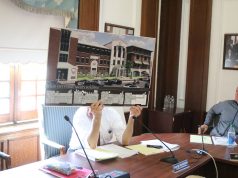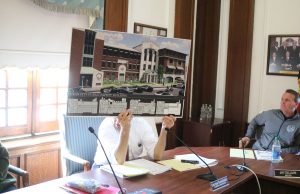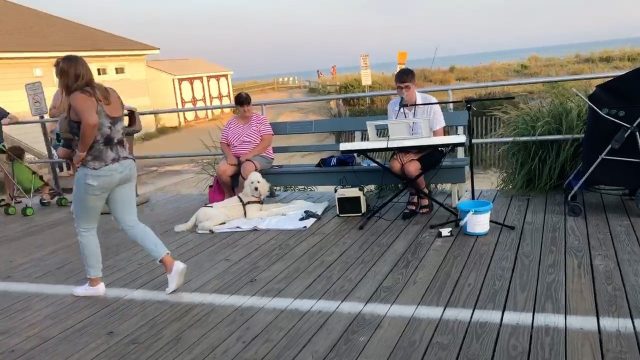
By Donald Wittkowski
Bryan Woolbert will be able to perform in front of the Ocean City Boardwalk crowds this summer after all.
In moving comments to City Council in March, the visually impaired keyboardist persuaded the governing body to revise a proposed ordinance that would have prevented him from playing his electric piano.
The ordinance would have prohibited Boardwalk entertainers from using amplifiers when they perform. Council and Mayor Jay Gillian said they are responding to complaints from merchants and the public that the performers are too loud, effectively drowning out the Boardwalk atmosphere with amplified music and singing.
Although the ban on amplifiers is the focus of the ordinance, Woolbert alerted city officials at the Council meeting on March 26 that the original version would have also prohibited electric keyboards.
Based on his comments, Council revised the language and introduced an amended ordinance Thursday night that allows electric keyboards. Amplifiers will still be banned, though. The measure is scheduled for a public hearing and final vote by Council on April 25.
Woolbert, 20, of Egg Harbor Township, could not attend Thursday’s Council meeting because he was tied up with classes at Cairn University in Langhorne, Pa., where he is a sophomore. Reached by phone, he thanked the governing body for amending the ordinance to allow electric keyboards.
“That’s awesome,” he said. “I owe them so many thank-yous.”
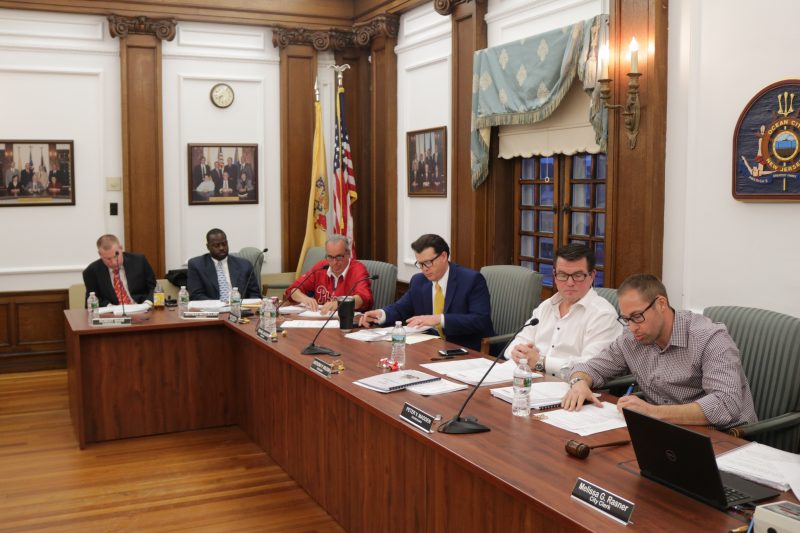
A musician, singer and songwriter, Woolbert has been entertaining the Boardwalk crowds for the past three years. Clearly happy that he will be able to return to the Boardwalk this summer, he said he is hopeful that the revised ordinance will also benefit other keyboardists as well.
“Glory be to God for giving me the words to say it,” he noted of his persuasive remarks to Council in March.
Woolbert is legally blind and can see only in his left eye. He is a music major at Cairn University, a Christian college. He hopes to make a career in the music industry, perhaps as a producer or sound engineer.
Although Woolbert is happy with the revised ordinance, other Boardwalk performers and some members of the public object to the proposed ban on amplifiers. In public comments during Thursday’s Council meeting, they said the entertainers energize the Boardwalk and should be allowed to use amplifiers to sing and play.
“I think this would give the town a little more life if musicians were encouraged,” Ocean City resident Georgina Shanley said.
The Council members said they would be willing to reconsider the ordinance if it proves too onerous.
In the meantime, the measure is being pitched by city officials as a fair compromise for lowering the volume on the Boardwalk without completely muffling the entertainers.
Councilman Tony Wilson said the ordinance still allows Boardwalk performers to showcase their talents. He noted, for instance, that his daughter, Julia, a vocalist who is the reigning Junior Miss Ocean City, can sing well without using amplifiers or a microphone.

However, performers Chris and Deborah Myer, a married couple from Marmora, said they need to use amplifiers so that people can hear them when they play their guitars and sing on the Boardwalk.
“It’s not fair, because you’re fighting other sounds on the Boardwalk,” Chris Myer said of the background noise from the amusement parks, restaurants and retail shops on the bustling promenade.
The Myers said they will probably return for their fourth year as Boardwalk performers, but pointed out that they will be playing acoustic guitars. They perform gospel and contemporary Christian music, donating any money they make from tips to the Atlantic City Rescue Mission.
One merchant, Jody Levchuk, an owner of the Jilly’s shops on the Boardwalk, said he does not oppose the entertainers, but believes that amplifiers should be banned to limit the amount of noise and disruptions.
“I love seeing the entertainment up there, but I think there’s a right track, and I think we are doing it,” Levchuk said of the noise restrictions in the ordinance.
In other business Thursday, Council approved the city’s $78.9 million municipal budget for 2019. The spending plan keeps the local tax rate stable.
For the owner of a typical home assessed at $675,000, the annual local property tax bill will be about $3,100. The figure does not include county or school taxes, said Frank Donato, the city’s chief financial officer.
The city’s finances have been strengthened by its growing tax base, including $133 million in new ratables this year alone, Donato said. The city’s total tax base is now $11.8 billion, the third largest among New Jersey’s municipalities.
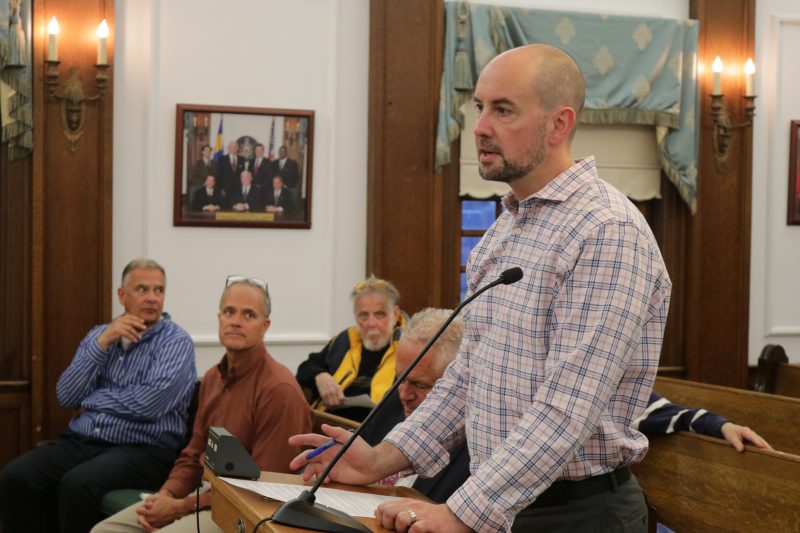
Council, though, did make one spending cut before the budget was adopted, eliminating $50,000 from the Fire Department’s salaries and wages in an attempt to reduce overtime.
Donato explained that there had been “some concerns” about the amount of overtime amassed by the Fire Department. A meeting was held between city officials and Fire Chief Jim Smith to address the issue.
Councilman Keith Hartzell proposed the $50,000 spending cut, which was endorsed by the rest of the governing body.
Hartzell praised the Fire Department for doing a “great job,” but he thought the spending cut was a “good move” to challenge the department to reduce overtime costs.
The money taken from the Fire Department’s wages and salaries was redirected to the budget’s surplus account.
Council members stressed that if there is ever a drastic need for more overtime in the Fire Department, particularly during an emergency, the money could be transferred back to the department.


